BY STEPHEN MIRARCHI
National Catholic Register Correspondent
June 8-14, 2008
WASHINGTON -- When five Dominicans were ordained on May 23 at the Dominican House of Studies in Washington, D.C., it was the fruit of a long process.
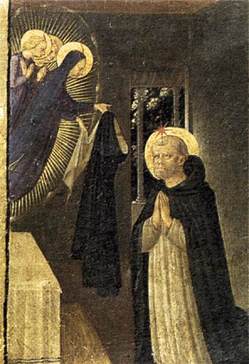 The Order of Preachers, whose religious and priests are commonly called Dominicans after their founder St. Dominic, took a high profile role in Pope Benedict XVI's U.S. visit. And their profile is only getting higher.
The Order of Preachers, whose religious and priests are commonly called Dominicans after their founder St. Dominic, took a high profile role in Pope Benedict XVI's U.S. visit. And their profile is only getting higher.The Dominican House of Studies -- the order's prominent seminary in Washington, D.C. -- recently announced plans to build a new academic center and theological library, confirming an increase in vocations and a broad expansion of the order.
The Dominicans' long-standing reputation for forming highly educated religious and priests appeals to many called to vocations these days, but study alone is not the draw, said Father John Langlois, master of students at the Dominican House of Studies.
"We see study as a contemplative activity," he said. "We seek to integrate it into our prayer life. It's pushing lectio divina [prayerful reading of Scripture] to a new level: This is a meditative study of theology, nourishing our life of prayer."
To that end, the study of St. Thomas Aquinas -- one of the Church's master theologians and a Dominican himself -- is an important emphasis for those in formation.
"They imbibe the teaching of Aquinas," said Father Langlois, who agreed that the Angelic Doctor is neglected even in Catholic education these days. "If they don't do it here, where are they going to do it?"
The new priests for the Dominicans are: Father Martin Philip Nhan, Father Pius Pietrzyk, Father Hugh Vincent Dyer, Father John Martin Ruiz-Mayorga, and Father Thomas Joseph White. There are as many stories as there are Dominicans.
"Our formation takes place in the context of our community life," said Father Langlois, "which models the life for the brothers. There's a fraternity with the older members who've been active for many years, and they share their experience. It's a complete integration of study, prayer, common life and the apostolate, from direct service with the poor to hospital and campus ministries to RCIA in parishes."
Even the order's prayers, while deeply liturgical and traditional, have their own ring to them.
"There are distinctive antiphons and Psalm tones," Father Langlois said, "as well as Dominican propers. There are some chants that are proper to the order. We do a fair amount of chant, and we're trying to integrate it more. While our Salve Regina and Regina Coeli are in the same modes as the Gregorian, they are distinctive, with their own flourishes."
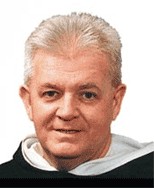 This unique path within the living tradition of the Church comes down from the establishment of the order, said Father Gabriel O'Donnell, vice president and academic dean of the pontifical faculty of the Immaculate Conception at the Dominican House of Studies.
This unique path within the living tradition of the Church comes down from the establishment of the order, said Father Gabriel O'Donnell, vice president and academic dean of the pontifical faculty of the Immaculate Conception at the Dominican House of Studies. "Our way is unique in that we are tied together by the decision of St. Dominic and St. Thomas," said Father O'Donnell, who has spent some of his life in diocesan seminaries. "We're tied inextricably together through liturgical life and community life; it's not possible to be formed for the priesthood without the whole life."
That corpus, as it were, goes beyond preparation for the priesthood. A more apt description, said Father O'Donnell, "is formation for a way of life in which one is a priest. You're not a Dominican and a priest; you're a Dominican priest."
The same charism cannot be mirrored in diocesan formation, which prepares a man for a way of life he carries with him from one parish to the next.
"Dominican formation," said Father O'Donnell, "is not preparatory; it is the way of life we continue until we die. Formation is never outside of the framework of the strong community of faith. The community takes responsibility for caring for each other, and there's a lot of freedom there."
Challenges
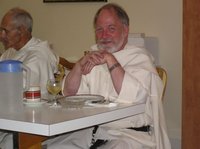 Still, Father O'Donnell admitted, community life has its challenges. "We're all a little bit eccentric. The greatest penance of Dominican life is the common life."
Still, Father O'Donnell admitted, community life has its challenges. "We're all a little bit eccentric. The greatest penance of Dominican life is the common life."Brother Austin Litke, who's finishing his second year of theology at the Dominican House of Studies, agreed.
"Community life presents you with all kinds of involuntary penances, and they're always more efficacious than the ones we take on ourselves. If you embrace that, it creates a habit of deferring your will to another, and in the spiritual life that trains you to give your will to God."
The common life is, in fact, what drew Brother Austin to transfer to the Dominicans after studying for five years in diocesan seminaries as a collegian and first-year theologian.
"Back in my home diocese in rural western Kentucky, [diocesan priests are] pastors for likely two or three parishes. Being very busy in the ministry of parishes is a beautiful way of life, but I felt the draw of the common life. Part of it is temperament, but part of it is accountability, which forms character. The common life is a school of charity, day in and day out, and that's a challenge."
Brother Austin also agreed that study integrated with prayer and the common life takes a different kind of dedication.
"In diocesan seminaries you study in a way that you most likely won't again. Here, study is to be a part of our lives always, a formal commitment that distinguishes how we live our priesthood. There's a continuity of life here; there's no urgency to get ordained."
How seminarians are guided along that path -- how their formation is administered, in other words -- is a question specific to their ministry, said Father Stephen Boguslawski, president of the Dominican House of Studies and executive director of the John Paul II Cultural Center.
"The diocesan rector establishes the general tone of the seminary; he oversees the whole operation," he said. "He stands in for the bishop, and that means a high concentration of administration in one person. In Dominican formation, those responsibilities are diversified; I, for instance, oversee the intellectual development as well as our own" plan of studies.
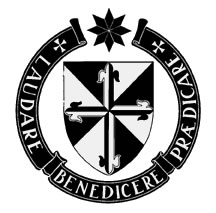 That expansion of responsibility extends down through the ranks, with the newest seminarians learning directly from Dominicans ordained for decades.
That expansion of responsibility extends down through the ranks, with the newest seminarians learning directly from Dominicans ordained for decades. "There is a sense in Dominican formation," Father Boguslawski said, "that all are being led by their older brothers; in that sense it's more comprehensive. What happens in the choir or in the chapel is carried into the classroom, just as what happens in the library affects their manner of prayer."
This program of formation is working exceedingly well for the Dominicans, said Father David Toups, the U.S. Conference of Catholic Bishops' associate director of the Secretariat for Clergy, Consecrated Life and Vocations. "There's a very healthy integration of spiritual, human, academic and ministerial formation at the Dominican House," he said. "Section 115 of the "Program for Priestly Formation" speaks of spirituality as the integrating force of the other dimensions, and I see that happening there."
The author of "Reclaiming Our Priestly Character" -- a scholarly and spiritual treatise on the sacrament of Holy Orders -- Father Toups lauded in the Dominican House of Studies' formation what he sees in successful seminary programs across the country. "In all of his addresses, Pope Benedict XVI brings it back down to the basics: a personal, loving, and intimate relationship with Jesus Christ. It's about teaching our young people how to pray. It's a genuine relationship with Christ that grounds everything."
Father Boguslawski also mentioned the importance of reaching youth.
"The rising generation is coming with a different set of challenges forged from the matrix of the culture. That's why the 'Program of Priestly Formation' will always undergo updating."
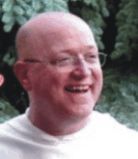 In the meantime, the Order of Preachers will continue to serve according to their charism.
In the meantime, the Order of Preachers will continue to serve according to their charism. "From the very inception of our ministry," Father Boguslawski said, "the order was established to serve the Church and the bishops through the preaching office."

